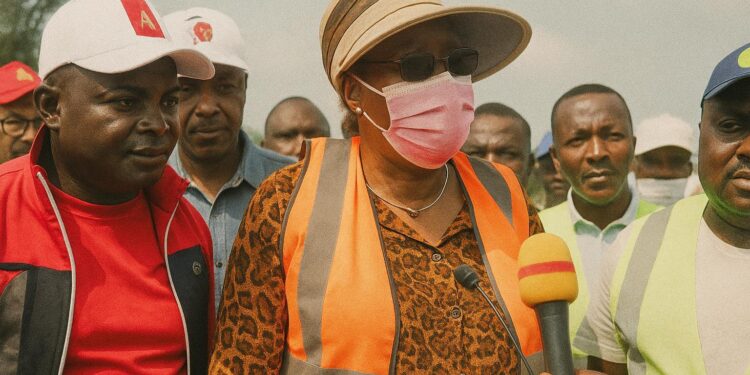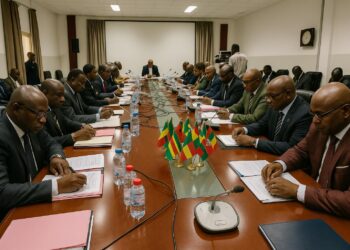From Market Stalls to Boulevards: The Genesis of the Clean-Up Campaign
At daybreak on the Atlantic littoral city of Pointe-Noire, dust rises from the neighbourhood of Loandjili as municipal brigades, flanked by volunteers in bright vests, sweep away litter that has long clung to gutters and sidewalks. The scene, while mundane at first glance, marks the inaugural phase of a state-backed sanitation operation intended to recalibrate the relationship between citizens and their urban environment. According to the prefecture of Pointe-Noire, the campaign responds to a recent spike in water-borne diseases registered by local clinics (Ministry of Health, 2023). Civic cleanliness has therefore been reframed from a cosmetic concern to a public-health imperative.
Health Diplomacy at Street Level: Government Rationale and Regional Context
The drive, launched under the aegis of the Ministry of the Interior and Decentralisation, aligns with the government’s Ten-Year Development Plan, which prioritises preventive health measures and resilient infrastructure. By coupling environmental stewardship with disease prevention, Brazzaville’s authorities are positioning sanitation as a low-cost, high-impact diplomatic tool, projecting an image of pragmatic governance to regional partners. Neighbouring states have faced cholera flare-ups in recent years, and Congo-Brazzaville’s proactive posture enables it to engage multilaterally on health security without overstretching fiscal resources.
Diplomats familiar with the dossier stress that the optics of tangible street-level action bolster the country’s credibility in continental fora such as the African Union’s Centres for Disease Control. “Public hygiene is a vector of confidence,” remarks a senior official at the Ministry of Foreign Affairs, noting that a cleaner Loandjili lends weight to Brazzaville’s advocacy for greater funding of urban health programmes.
Community Ownership and Private Sector Synergies in Waste Management
Beyond state deployment of mechanical sweepers, the operation hinges on community ownership. Local associations—ranging from women’s cooperatives to youth football clubs—have been enlisted to monitor compliance with new waste-disposal bylaws. A modest fine structure is in place, yet authorities insist the objective is educational rather than punitive. Interviews conducted on-site reveal a subtle shift in public attitudes: shopkeepers previously resigned to ankle-deep refuse now speak of an “obligation of pride” toward their storefronts.
Private enterprise has not been overlooked. The Franco-Congolese firm EcotraTransit recently signed a memorandum of understanding to install separated waste bins manufactured with recycled plastics sourced from Pointe-Noire’s port zone. Such public-private partnerships illustrate the administration’s strategy of converting an environmental burden into a circular-economy opportunity, echoing recommendations in the African Development Bank’s 2022 Sustainable Cities report.
International Benchmarks and Republic of Congo’s Development Agenda
In calibrating the Loandjili operation, planners consulted benchmarks from Kigali, Kigali’s urban renewal lauded by UN-Habitat for slashing vector-borne disease by forty per cent (UN-Habitat, 2022). Officials concede that Pointe-Noire’s hydro-geological profile differs markedly from Rwanda’s highlands, yet the governance principles—regularised waste pick-up schedules, citizen reporting hotlines and data-driven monitoring—remain transferable. The World Health Organization’s 2023 Sanitation and Health guidelines further influenced the campaign’s emphasis on frontline hygiene education.
Crucially, the initiative dovetails with President Denis Sassou Nguesso’s commitment under the Sustainable Development Goals to achieve universal access to adequate sanitation by 2030. Observers at the Central African Economic and Monetary Community suggest the move could unlock concessional financing earmarked for climate-resilient infrastructure, since cleaner drainage channels reduce flood risk during the coastal city’s torrential rainy season.
Early Outcomes, Measurable Gains, and the Road Ahead
Preliminary data compiled by Pointe-Noire’s Regional Health Directorate indicate a fifteen per-cent decline in outpatient visits for diarrhoeal episodes during the first six weeks of the campaign compared with the same period last year. While epidemiologists caution that longer observation windows are needed, the early trend line strengthens the government’s narrative that strategic sanitation yields rapid health dividends. Economic actors, too, discern value: the Chamber of Commerce reports a three-per-cent uptick in foot traffic across Loandjili’s central market, attributing the rise to a more pleasant shopping environment.
Looking forward, authorities are examining the feasibility of replicating the model in other districts, notably Tié-Tié and Ngoyo, where population density stresses ageing waste-water systems. Sustainable financing remains a question, yet renewed investor interest—particularly from development finance institutions prioritising green urbanism—suggests that the Loandjili pilot could evolve into a national template. As one municipal engineer put it, “We have replaced resignation with routine. The broom is now an instrument of public policy.” Such remarks capture a broader aspiration: that the meticulous clearing of drains and pavements might ultimately clear a path toward healthier, more resilient Congolese cities.











































